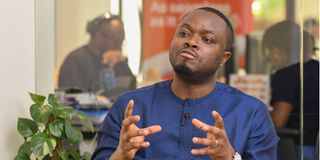HR technology company SeamlessHR raises Sh1bn in funding

SeamlessHR’s co-founder and Chief Executive Officer Emmanuel Okeleji.
What you need to know:
- The company specialises in investments in modern technology to improve workforce productivity.
- SeamlessHR has reached to over 2,000 businesses across 20 African countries which use its software to manage HR.
Kenyan based human resource (HR) technology company, SeamlessHR has raised over Sh1 billion in funding from the Gates Foundation and Helios Digital Ventures, amid its plan to expand across Africa.
The company, which specialises in investments in modern technology to improve workforce productivity, announced raising the $9 million funding on Monday, noting that the latest funding would accelerate its plan to expand its reach across the continent through modern solutions such as AI-driven workforce management technology.
“While we continue to accelerate our work to optimize workforce productivity in both the public and private sectors across the continent, much of our attention will also be on empowering hardworking Africans with responsible credit products that will help them use their employment as collateral to enjoy a better life,” said SeamlessHR’s Co-founder and Chief Executive Officer Emmanuel Okeleji.
Enhance workforce productivity
The company has reached to over 2,000 businesses across 20 African countries which use its software to manage HR and payroll processes for about 300,000 employees.
SeamlessHR notes that the new investment is also expected to aid its drive to enhance workforce productivity, and accelerating business performance through innovative solutions including embedded finance offerings, and AI-driven workforce management technology.
While Mr Okeleji notes that global disruptions such as the Covid-19 pandemic and geopolitical conflicts in Europe and the Middle East have affected economies and worsened the poverty situation, offering finance products would better the situation.
“We are confident that our suite of embedded finance products will contribute to alleviating these problems at scale for our people so that working Africans like people in other parts of the world will be able to leverage responsible credit to gain better access to basic life needs like shelter, mobility, food, and education,” he says.


